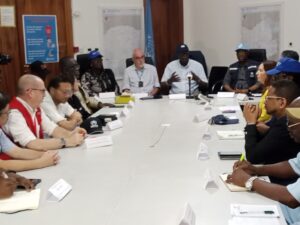A United Nations team, alongside various international and national NGOs, arrived in Maiduguri on an assessment visit following the devastating Alau Dam flood. The delegation, led by UN Resident and Humanitarian Coordinator in Nigeria, Mohamed Fall, visited camps to interact with victims and paid solidarity visits to Borno State Governor Babagana Zulum.
Speaking during the visit, Fall expressed the UN’s commitment to providing support in response to the disaster. “We are with you in sympathy and solidarity, and we will translate that into action,” he said, assuring that the UN would redirect resources to scale up its response. Fall also announced that the United Nations Development Programme (UNDP) would conduct a comprehensive post-disaster assessment and develop a recovery plan.
Governor Zulum thanked the UN delegation for their continued interventions in Borno and emphasized the need to prioritize the immediate needs of flood victims, including food, healthcare, shelter, and sanitation. He also called for the rapid fumigation of safe areas to prevent disease outbreaks and facilitate the return of displaced residents to their homes. Zulum stressed the importance of reopening schools, which have been closed due to the use of some facilities as camps, noting the impact of prolonged insurgency on children’s education.
The flood, which occurred on Tuesday, displaced over 414,000 people and claimed 37 lives, with 58 others injured, according to data from the National Emergency Management Agency (NEMA). The disaster has also damaged infrastructure, including bridges, and hampered access to hospitals, schools, and markets, raising concerns about potential disease outbreaks. Evacuations of those in high-risk areas are ongoing.
The UN has pledged to collaborate with the state government to address these challenges and support the recovery efforts.








